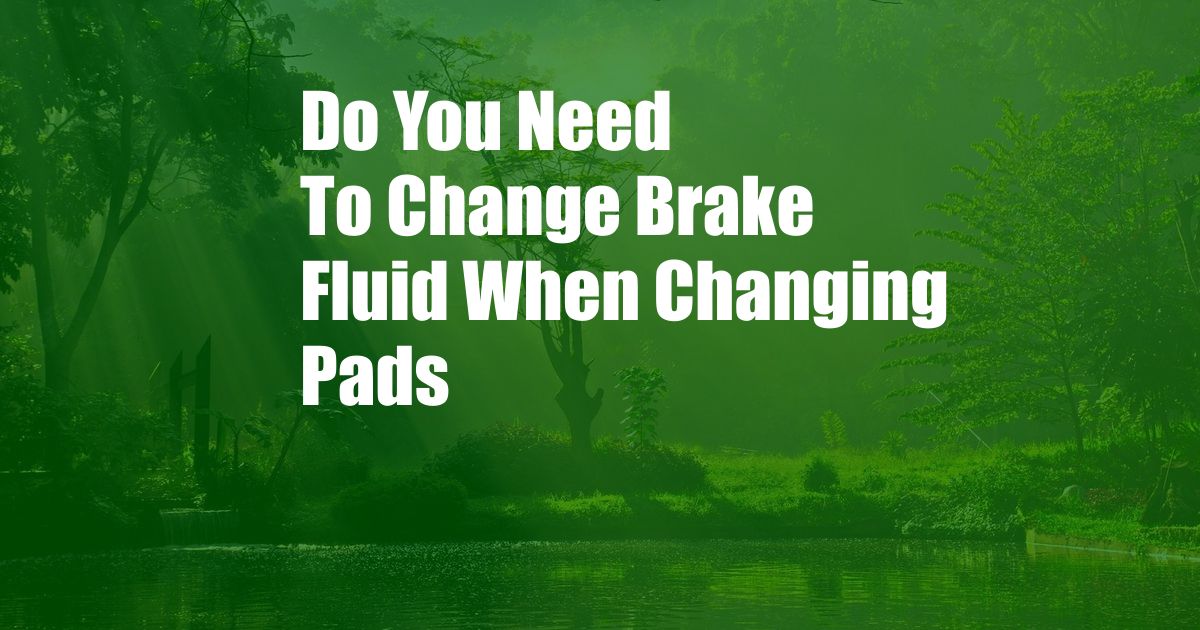
Do You Need to Change Brake Fluid When Changing Pads?
As I gripped the steering wheel, my heart pounded with anxiety. The car ahead braked abruptly, and my foot instinctively hit the brake pedal. To my horror, my vehicle didn’t respond as it should, and we narrowly avoided a rear-end collision. That close call left me shaken and questioning the condition of my car’s braking system. I knew I had to address the issue promptly.
During my research, I stumbled upon a crucial question: should I change my brake fluid when replacing brake pads? This article delves into the intricacies of this topic, exploring the rationale behind brake fluid replacement and providing expert insights to guide your decision-making.
Importance of Brake Fluid
Brake fluid serves as the hydraulic medium that transmits force from the master cylinder to the brake calipers and wheel cylinders. When you press the brake pedal, pressure builds up in the brake lines, pushing the fluid and activating the brake pads. Without brake fluid, the entire braking system would cease to function.
Reasons for Brake Fluid Deterioration
Over time, brake fluid can degrade due to various factors, including:
- Moisture Absorption: Brake fluid is hygroscopic, meaning it absorbs moisture from the surrounding air. This can lower the fluid’s boiling point, making it more susceptible to vaporization under high heat.
- Contamination: Brake fluid can also become contaminated with dirt, debris, and metal shavings from the brake system.
- Chemical Breakdown: High temperatures generated during braking can cause the brake fluid to break down chemically, reducing its effectiveness.
Consequences of Deteriorated Brake Fluid
Deteriorated brake fluid can lead to several issues:
- Reduced Braking Efficiency: The presence of water or air in the brake fluid can cause a spongy or soft brake pedal, resulting in reduced braking performance.
- Brake Fade: Vaporization of brake fluid under high temperatures can lead to brake fade, where the brakes lose their effectiveness.
- Corrosion: Contaminated brake fluid can corrode metal components in the brake system, compromising their performance and lifespan.
The Relationship Between Brake Fluid and Brake Pads
Changing brake pads involves replacing the friction material that comes into contact with the brake rotors. While brake pad replacement is necessary for maintaining optimal braking performance, it does not directly affect the condition of the brake fluid.
When to Change Brake Fluid
The recommended intervals for brake fluid replacement vary depending on the vehicle manufacturer and driving conditions. Generally, it’s advisable to flush and replace brake fluid:
- Every 2-3 years
- After 30,000-50,000 miles
- If the fluid appears dark or cloudy
- If there is a noticeable drop in brake performance
Expert Advice and Tips
To ensure optimal brake system performance, follow these expert recommendations:
- Regular Brake Inspections: Have your brake system inspected regularly by a qualified mechanic to identify any potential issues, including deteriorated brake fluid.
- Use DOT-Approved Brake Fluid: Always use brake fluid that meets the specifications recommended by your vehicle manufacturer. Different grades of DOT-approved brake fluid have varying boiling points and performance characteristics.
- Avoid Mixing Brake Fluids: Do not mix different types or brands of brake fluid, as this can affect the fluid’s properties and performance.
- Proper Brake Fluid Disposal: Dispose of old brake fluid responsibly at an authorized recycling facility to prevent environmental contamination.
Benefits of Regular Brake Fluid Replacement
Regular brake fluid replacement offers numerous benefits:
- Improved Braking Performance: Fresh brake fluid ensures optimal hydraulic pressure transmission, resulting in improved braking efficiency.
- Enhanced Safety: By preventing brake fade and other performance issues, regular brake fluid replacement enhances driving safety.
- Extended Brake System Lifespan: Removing contaminants and moisture from the brake fluid helps protect metal components from corrosion, extending the system’s lifespan.
Frequently Asked Questions
How often should I flush my brake fluid?
Flush your brake fluid every 2-3 years or after 30,000-50,000 miles.
Can I change brake fluid at home?
Brake fluid replacement is a relatively complex task that requires specialized tools and knowledge. It’s recommended to have it done by a qualified mechanic.
What are the signs of bad brake fluid?
Dark or cloudy fluid, low fluid level, or a spongy brake pedal can indicate deteriorated brake fluid.
Can I drive with dirty brake fluid?
Driving with dirty brake fluid can compromise braking performance and safety. It’s crucial to replace it as recommended.
Conclusion
While changing brake pads is essential for maintaining braking performance, understanding the condition of your brake fluid is equally important. Deteriorated brake fluid can lead to severe braking issues and safety hazards. Regular brake fluid replacement is a crucial maintenance task that ensures optimal hydraulic pressure transmission, enhances braking efficiency, and protects the entire brake system from corrosion.
By following the expert tips provided and heeding the recommended intervals for brake fluid replacement, you can ensure the safety and reliability of your vehicle’s braking system. Take the necessary steps to maintain your brake system, and ask a trusted mechanic if you have any further questions or concerns.
Are you interested in learning more about brake fluid and its impact on your car’s performance? Explore our website for additional resources and expert insights.